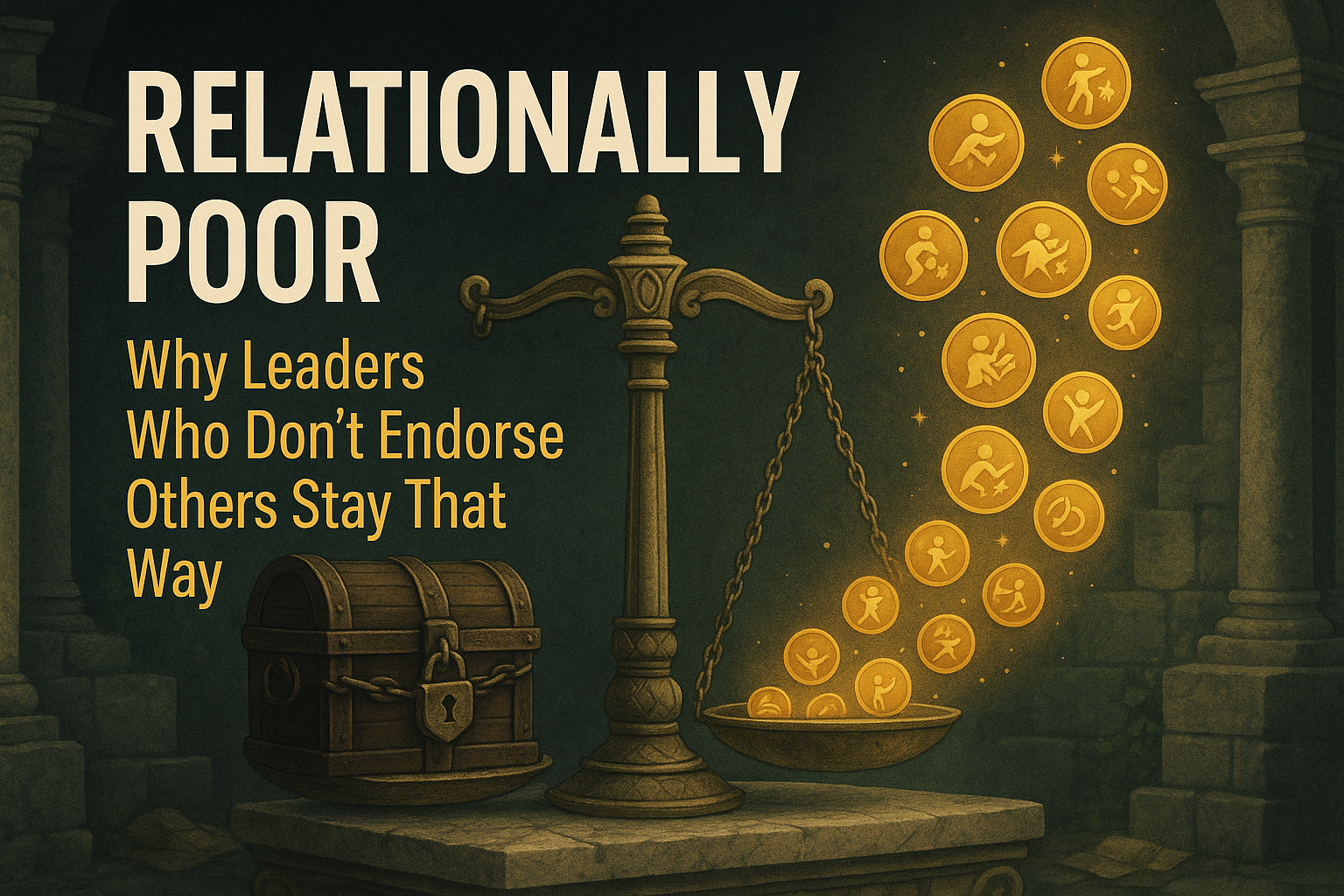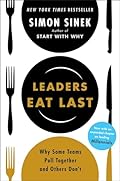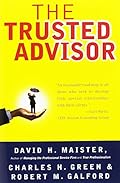
Why Leaders Who Don't Endorse Others Stay Relationally Poor
By Derek Neighbors on August 27, 2025
- My best developer asks me to endorse him for a senior role at a competitor.
This is the guy who saved three projects, mentored half the team, made me look brilliant in every client meeting. I should have written the recommendation immediately.
Instead, I found myself typing reasons he “wasn’t quite ready yet.” Deleted that. Started over with his technical gaps. Deleted that too. Spent two hours crafting excuses disguised as developmental feedback.
I was protecting my access to his talent by keeping him small. The leader who had spent months bragging about developing people suddenly couldn’t risk his reputation to prove it.
I was hoarding endorsements like a miser hoards gold, terrified that investing in his success would leave me poor. And in that moment of cowardice, I became exactly the kind of leader people tolerate instead of follow.
The Leadership Cowardice Pattern
This is leadership cowardice masquerading as prudent judgment.
Here’s what I learned when I finally endorsed him six months later (after he’d already taken another role): Your willingness to risk your reputation for someone else’s growth reveals everything about your actual confidence in your leadership.
We talk about developing people, but when the moment comes to prove it costs us something, we become calculating cowards.
Most leaders will praise team members in private meetings and celebrate wins in team calls. But the moment someone asks them to put their reputation on the line for someone else’s advancement, they suddenly become risk analysts. They find every technical reason why their star performer isn’t ready for external recognition.
The pattern is always the same: “They’re not quite ready yet.” “Let’s wait another quarter.” “What if it doesn’t work out?”
Here’s what they’re really saying: “My comfort matters more than your growth.”
The Ways We Justify Cowardice
Pattern 1: The “Not Quite Ready” Dodge
The Behavior: Finding technical reasons why your best performer isn’t ready for external recognition.
I’ve watched this play out dozens of times. A team member asks for a LinkedIn recommendation for their dream job. Instead of highlighting their strengths, the leader lists 47 areas for growth. They’ll spend paragraphs explaining why this person who’s been crushing it for months suddenly isn’t qualified for advancement.
The Truth: You’re protecting your access to their talent by keeping them small.
This is the opposite of phronesis (practical wisdom). True wisdom recognizes when someone’s growth requires your endorsement, not your protection. You’re choosing your convenience over their flourishing.
The manager who does this thinks they’re being helpful by identifying development areas. But what they’re really doing is using their position to block someone else’s path forward. They’re treating developmental feedback as a weapon to maintain control.
Pattern 2: The “What If They Leave” Hoarding
The Behavior: Refusing to endorse because it might accelerate their departure.
This one kills me because I’ve done it. You decline to introduce your high-performer to your network contacts because “we can’t afford to lose them right now.” You withhold the very connections that could transform their career because you’re afraid of what their growth might cost you.
The Truth: You’re treating people like assets instead of humans with their own arete (excellence) to pursue.
This violates eudaimonia (flourishing). You’re blocking someone else’s path to excellence to serve your short-term needs. You’re creating the exact conditions that make people want to leave.
The irony is brutal: The moment you start hoarding access to protect your team, you begin destroying the very relationships you’re trying to preserve. People can feel when their leader sees them as assets to be protected rather than humans to be developed. They are telling you with their behavior, even when they stay silent.
Pattern 3: The “Reputation Risk” Calculation
The Behavior: Calculating what their success or failure might mean for your standing.
You hesitate to recommend someone for a stretch role because their potential failure might reflect on your judgment. You’re more invested in appearing right than being helpful. Every endorsement becomes a risk assessment for your personal brand.
The Truth: You’re more invested in appearing right than being helpful.
This is philotimia (love of honor) corrupted. True honor comes from developing others, not from protecting your perfect record. You’re choosing your ego over their growth.
I’ve seen leaders spend weeks debating whether to endorse someone because they’re calculating the probability matrices of success and failure. They’re treating human potential like a stock portfolio instead of recognizing that endorsement is about believing in someone’s capacity to rise to a challenge.
I still catch myself doing this. Last month, a team member asked me to introduce her to a potential mentor. My first thought wasn’t “This could transform her career.” It was “What if she gets the guidance she needs and realizes she doesn’t need me anymore?”
I sat there for ten minutes crafting reasons why the timing wasn’t right, why she should develop more before making that connection. The real reason: I was terrified of becoming dispensable.
Here’s what I realized while staring at that unsent email: I needed her to need me more than she needed the introduction. I was treating her growth as a threat to my relevance instead of proof of my impact.
The most brutal truth about leadership insecurity isn’t that we want to be important. It’s that we’ll sacrifice someone else’s advancement to maintain the illusion that we are.
What Actually Works
Here’s what I learned when that developer left anyway:
The leaders who endorse freely are the ones people remember when they’re in positions to choose.
Three years later, he became CTO at a major firm. His first hire? Someone from my team. Not because I finally endorsed him, but because he remembered that I eventually chose his growth over my comfort. That one late endorsement generated more referrals than five years of calculated relationship management.
I wish I could tell you I learned this lesson once and never struggled with it again. But three weeks ago, I caught myself hesitating to recommend someone because their success might make me look less essential. The cowardice never fully dies. It just gets quieter about its excuses.
What actually works is brutal in its simplicity: Stop protecting your reputation and start building it by building others.
The math is counterintuitive but consistent: The more aggressively you endorse people, the more people want to work with you. The more you invest your reputation in others’ success, the stronger your reputation becomes. If money is why they stay, money is why they’ll leave, but genuine investment in their growth creates loyalty that compensation never can.
But here’s what changed everything for me: I stopped thinking about endorsements as investments and started thinking about them as expressions of what I actually believed about human potential.
When someone asks for an endorsement, they’re not asking you to guarantee their success. They’re asking you to believe in their capacity to rise to a challenge. The question isn’t whether they’ll succeed perfectly. The question is whether you believe they’re worth betting on.
The Diagnostic Questions
Before you withhold your next endorsement, ask yourself:
What am I afraid I’ll lose if they succeed beyond my influence?
This question cuts through all the rational-sounding excuses and gets to the fear. Are you afraid of losing access to their talent? Afraid they won’t need you anymore? Afraid their success will make you look less important?
What story about my importance am I protecting by keeping them small?
Most endorsement hoarding comes from a story about your indispensability. You need them to need you to feel valuable. But the leaders who create the most value are the ones who make themselves dispensable by developing others.
What would I have to feel if they outgrew their need for my guidance?
Terror. That’s what you’d have to feel first. Terror that you might not be as essential as you thought. Terror that your value was always more about their dependence than your influence.
What am I afraid I’ll discover about my actual value if I’m not indispensable?
This is the deepest fear: What if I’m not as valuable as I think I am? What if they succeed without me and everyone realizes I wasn’t the key ingredient I thought I was?
Here’s the truth: Your value as a leader isn’t measured by how much people need you. It’s measured by how much they grow because of you.
How is my focus on “being careful” protecting me from the vulnerability of genuine support?
“Being careful” is often code for “avoiding the risk of being wrong about someone.” But genuine support requires the willingness to be wrong. It requires the courage to believe in someone’s potential even when you can’t guarantee the outcome.
The answers will tell you whether you’re developing leaders or just collecting followers.
The Challenge
Here’s your challenge: Look at your team right now. Stop babying them and start believing in what they can become.
Stop bullshitting yourself:
Identify the hoarding: Name one person right now. Someone who could benefit from your endorsement but you’ve been finding reasons to wait. Send that email before you finish reading this article.
Face what you’re protecting: What reputation or position are you guarding? What story about your importance are you preserving by keeping them small?
Ask the diagnostic questions: What are you really afraid of? Why do you need them to need you?
Deal with your insecurity: The need to be needed is not leadership. It’s emotional dependency disguised as development. If you want to build leaders, stop naming them and start developing them.
Watch what emerges: How does your team respond to genuine endorsement? How do people treat a leader who’s willing to risk their reputation for others’ growth?
Don’t manage your reputation. Build it by building others.
The most powerful thing you can do as a leader is to become known as someone who believes in people’s potential even when they don’t believe in it themselves. Become the leader who endorses aggressively, who connects people to opportunities, who risks being wrong about someone’s readiness because you’d rather err on the side of their growth.
Final Thoughts
I spent years protecting a reputation that only existed because other people made me look good. The moment I started hoarding endorsements to preserve it, I began destroying the very thing I was trying to protect.
That developer I almost failed? He taught me that your reputation isn’t built by the risks you avoid. It’s forged by the people you choose to believe in when believing costs you something.
The leaders who stay relationally poor are the ones who confuse being needed with being valuable.
Ready to stop protecting your reputation and start forging it through others’ success? MasteryLab provides the framework and community for leaders who are done being calculating cowards. Join us if you’re ready to risk being wrong about someone’s potential.



